Enter Stage Left
and all the men and women merely players;
they have their exits and their entrances;
and each man in his time plays many parts.
-William Shakespeare, As You Like It
Act 2 Scene 1
In which we witness, yet again, why I leave the writing of good dialogue up to the lovely ladies at Damned Scribbling Women.
Setting: regular Tuesday knitting group at a grad student's apartment
Characters:
- Our knitting heroine (let's call her Theresa)
- Hostess (gracefully hosting knitting group, has tragically never been to San Diego)
- Friend-of-Hostess (reads Japanese, knits, and might be moving to San Diego)
- JayJay (knitting friend of Theresa's who is moving near San Diego)
Hostess: Hello, Theresa. Thanks for coming. Meet my friend. She is Japanese and just started knitting last week.
Theresa: Hello, Friend. It's so nice to meet you. Do you read Japanese?
Friend: It's nice to meet you, too. Yes I do. Would you like help reading your Japanese pattern book?
Theresa: Yes, I would. Thanks so much. By the way, I'm moving to San Diego.
Friend: Wow - I might be moving to San Diego, too. (This is true.)
Theresa: Great. Let's be friends.
Other than the stilted dialogue, it was really just that great. Friend-of-Hostess clarified some of the symbols for me, but really, the chart is pretty easy to get the hang of. Want to see?
 For some reason, I just cannot photograph this color accurately. It's a deep heathered green. Any photographic hints?
For some reason, I just cannot photograph this color accurately. It's a deep heathered green. Any photographic hints?So, for those of you also working on Am Kamin, a few comments:
- The twisted stitches are actually more like 1x1 cables in that they involve purling one of the stitches. I started that way, but then switched to the way I usually work, say, Bavarian twisted stitch patterns and knit both stitches. I've been purling those stitches on the next row, and I think it looks pretty good - unnoticeable, and it's MUCH faster. Thoughts?
- And how are you going to do this flat?
- I like the "outside" of the tubular cast on better than the "inside," so I flipped my hat inside out after the ribbing and began working as if that were the right side. This way the nicer side of the tubular cast on shows when you turn up the hem.
- Regarding reading the pattern (you've probably already figured this out) - they use E vs. E prime to tell you to reverse the direction of the cables/twists on the opposite side - isn't that clever?







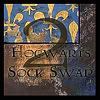










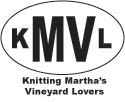



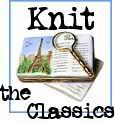










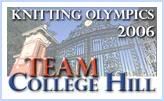
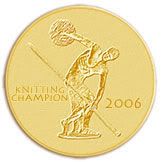
8 Comments:
What a timely introduction!
I think only time will tell on the Knitting Olympics! It'll be interesting tho...
Lovely hat. That sweater is going to be gorgeous!
T, I have to take issue with your criticism of Knitting Underway dialogue. How many people could have meaningful conversation with a nylon pattern? You do it with flair.
Love the poem! And am so impressed with the hat and sweater! Happy to hear about the "chance" meeting!
I'm so glad the knitting group could help facilitate your bid at the knitting olympics! Does this make us trainers? ;)
Hellooo there, this is the said "friend of hostess" (I really do exist!) in this entry.
I'd like to clarify for all the Knitting Underway fans that all I did was translate two Japanese characters (one for "row", another for "stitch") and the rest was all Theresa's doing... she speaks the language of knitters, and had intuitive knowledge of the secret those Japanese folks were trying to reveal in the book. :) So glad to meet one who can guide me through the complexities of knitting!
ps - BTW, the Topeka connection was confirmed. And they met again in Charleston two weeks ago! What a small world.
green is the best!!!! I'd give you some photography tips, but I can't cuz I am impatient and suck at it :)
The way to photograph your green is to photograph in white light, not blue or yellow, as with incandescent or florescent...this means bright sunshine (or an OTT light) and, if you still have problems with green, it's the camera.
Post a Comment
<< Home